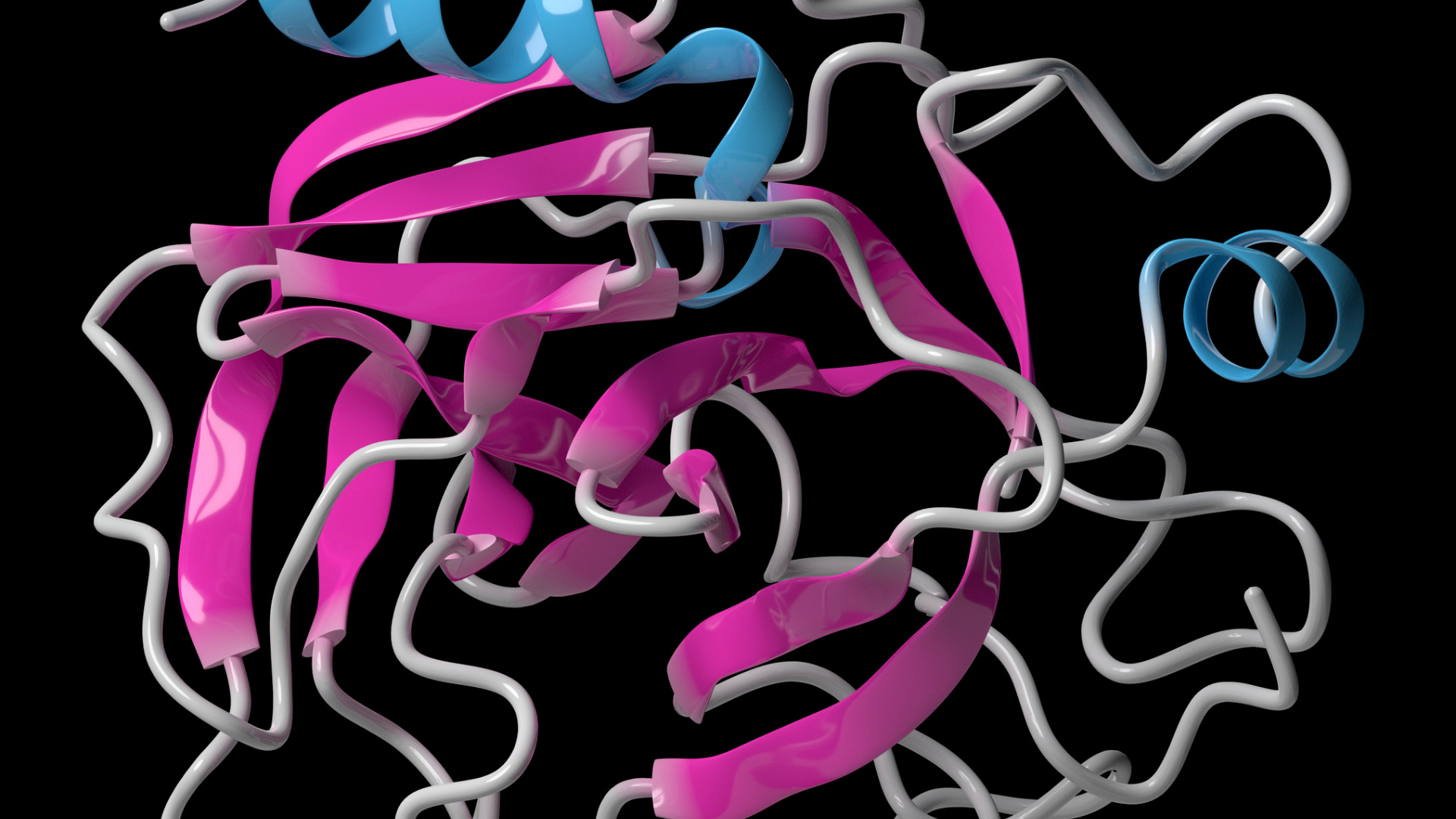Today’s topic is a personal favorite as it focuses on a healthy immune system + the best immune boosting herbs.
Dr. Taz is a master of all things hormones, immune system, and Gutsy topics, so I could not be more excited for today’s show.
Subscribe Today:
Apple Podcasts | Spotify | iHeart Radio | RSS
Best Immune Boosting Herbs (and the Gut-Immune Connection)
Click HERE to save this episode + best immune boosting herbs information for later.

Resources
- Dr. Taz on Instagram
- Her website
- What is butyrate?
- Sleep and Gut Healing
- Why stress might be your worst enemy
- The #1 gut healing journal
Don’t Miss These Thoughts
- Who is Dr. Taz?
- Breaking down how the gut is connected to the immune system.
- What are signs of good immune health and gut health? And are there certain tests you can do to find out the status of both, simultaneously?
- Are there common things in Dr. Taz’s practice that she thinks are negatively affecting both immune and gut health? What are they?
- What are the best ways to improve both gut and immune health?
- Astragalus and other immune-boosting herbs for overall immunity.
- Other food, supplements, lifestyle that Dr. Taz likes using for all things gut-immune boosting?
How do Gut-Immune Issues Start?
Just as Dr. Taz mentions, gut-immune issues often present themselves in our 20’s but are a slow build up over time.
For women in particular, the issue comes from not understanding how to properly manage our hormones, gut, and mental health when we are growing up.
These issues do not just “turn on” overnight, but compile over time.
A combination of poor diet, sleep, and high-stress situations can further harm your gut and lead to further issues down the road.
Some common warning signs of an unhealthy gut include:
- gaining weight
- acne
- hair falling out
- mood swings
Often individuals fail to recognize these symptoms as the sign of something larger and attribute it to temporary stressors.
Being able to recognize these early signs could actually help prevent the more serious dysbiosis and poor immune system function that may occur later on.
Hormones and the Gut
As you can see, many of the early red flags for gut dysfunction seem very related to hormones.
When we think about things such as weight gain and acne in women, we immediately point our fingers at some sort of hormonal imbalance.
And while that is right, it is NOT the whole picture.
Most of our body’s hormones are metabolized in our intestines, so it should come as no surprise that gut issues = hormone issues.
For example, our thyroid hormone, which controls many responses relating to metabolism, is synthesized in our GI tract.
Many women who have thyroid disturbances find very little relief with hormonal therapy due to it having a deeper cause.
The gut is at the root of health
Dr. Taz
How is the Gut Related to Immune Function?
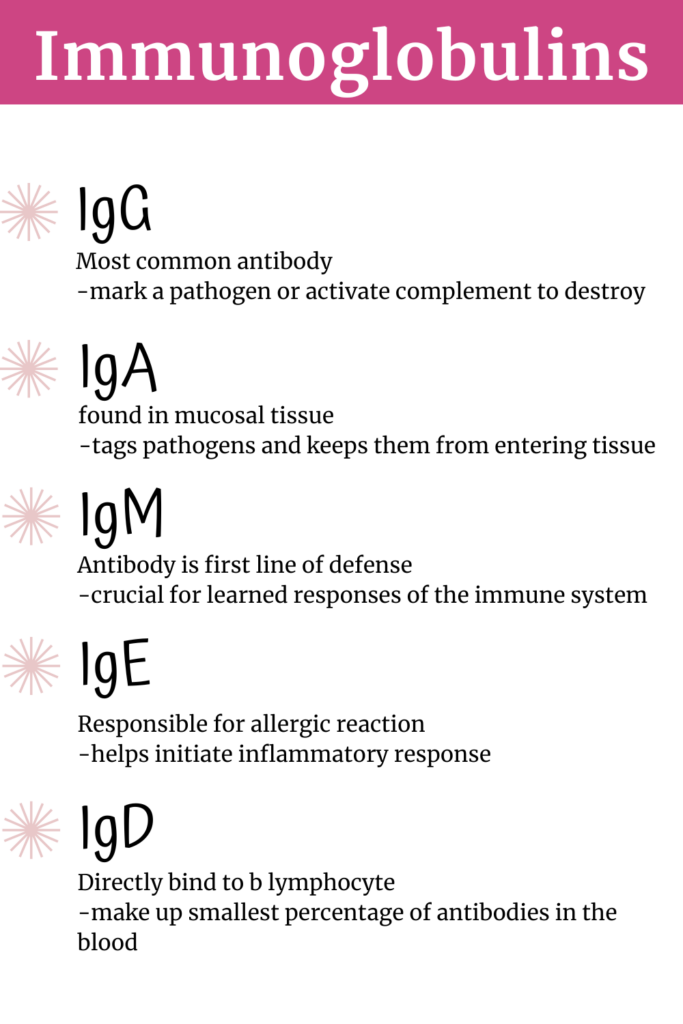
In addition to producing and converting hormones, the gut also creates proteins that are KEY players in the immune system.
The gut is responsible for manufacturing immunoglobulins, which are proteins that our body sends out to attack foreign invaders. You may know them as antibodies.
These proteins are CRITICAL for the antibody-mediated response of the immune system that can attack pathogens or viral infections that the body has already been exposed to.
Without them, we would get sick over and over again.
Here are some common immunoglobulins and their functions:
IgG
Most common immunoglobulin that is found primarily in blood and tissue. It can mark a pathogen for the immune system to destroy or it can activate complements for immediate destruction.
IgA
Found mainly in mucosal tissue and is the first line of defense. It tags pathogens and keeps them from entering tissue.
This is also the primary antibody that acts in celiac disease.
IgM
This antibody is one of the first lines of defense and crucial for learned responses of the immune system.
IgE
This antibody is the main one associated with any sort of allergic reaction.
It initiates the process of releasing histamine, which triggers immune cells to respond with inflammation.
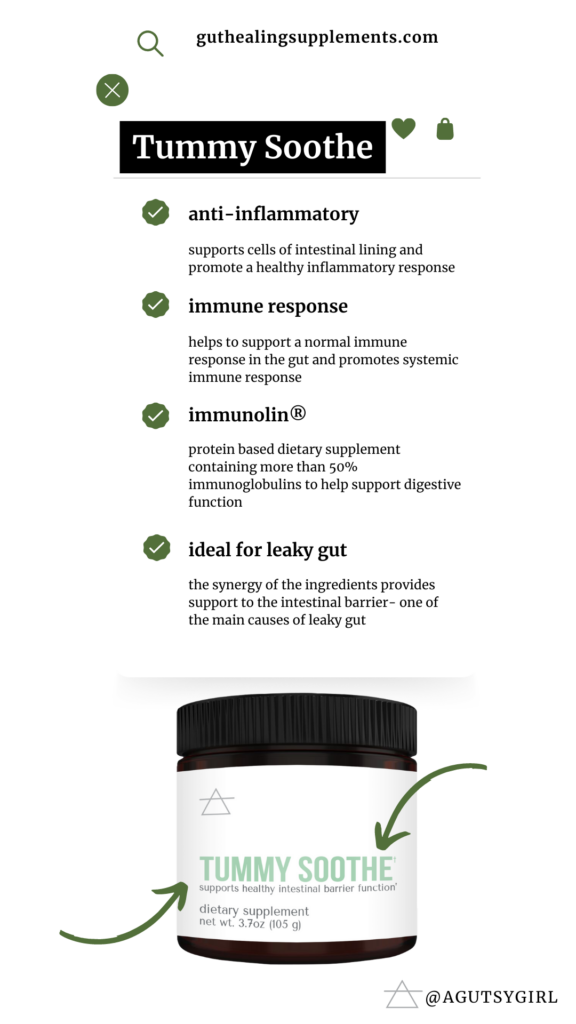
Contains a comprehensive blend of immunoglobulins and N-acetyl-D-glucosamine, specifically formulated to help repair and support the health of the gut lining.
IgD
These antibodies directly bind to B lymphocytes to trigger an immune response. They make up the smallest percentage of antibodies in the blood.
Unfortunately, if there is any sort of gut dysfunction present, the body has a hard time producing these antibodies and becomes much more susceptible to illness and pathogens.
Issues such as nutrition deficiencies, leaky gut, parasitic infection, and bacterial dysbiosis can all lead to a decrease in the number of antibodies the immune system is able to create.
Eventually, the dysregulation of the immune system can escalate into more serious concerns such as autoimmune diseases and chronic inflammation.
Source: HERE
What Are Some Signs of Poor Immune and Gut Health?
If your gut and immune system are in a good place, your body should be operating at its fullest potential.
However, there are some red flags to be on the lookout for that may signal your body needs a little rebalancing.
Signs your immune health is struggling:
- getting sick more than 1-2 times a year
- regularly getting rashes
- having bad allergies/ reactions
Signs your gut health is struggling:
- irregular bowel movements
- bloating
- brain fog
- inflammation
- rashes
- gas
- pain after eating
- inflammatory markers- skin issues, mood, and cognitive impairment
All of these are some clear indicators that you have some work to do.
Before starting on my gut health journey I was getting sick 1-2x a month much less a year!
Without properly fixing your gut your body will not be able to fight off pathogens or viruses, sending you in a constant loop of sickness.
Tests for Gut and Immune Health
If you can’t tell from symptoms alone or want some tangible evidence, some tests can signal issues in both the immune system and gut.
Testing IgG and IgA levels
This can be as simple as a blood draw and simply measures the antibodies in circulation.
- Low levels of IgG and IgA signify both gut and immune issues
- Low levels of IgG signify an immune issue
- Low levels of IgA signify a gut issue
Your practitioner can help you interpret these results to see which areas you need to focus your efforts in.
Checking cholesterol and fat-soluble vitamins
Low levels of fat-soluble vitamins such as A, D, E, and K can point to a leaky gut due to an inability to retain fats.
This paired with low cholesterol can be a significant indicator of weak intestinal integrity.
Gut tests
You can also get a more detailed report of your gut through GI testing such as GI Map or GI effects.
These tests can help see what tangible issues are going on in your gut as well as the balance between different microbes.
Common Factors That Negatively Affect Immune and Gut Health
Many different factors go into creating an unhealthy gut and immune system. Dr. Taz mentions some of her top ones in the podcast including:
Diet
Eating a diet rich in processed foods and sugar can lead to overgrowth of microbes in the intestinal tract. Also lacking a diverse and balanced diet can result in gut dysbiosis as well.
Micronutrient deficiency
Micronutrients are CRUCIAL to a healthy gut and immune system, in particular, zinc, vitamin B, and vitamin D. Being low in these micronutrients can shift your gut to a very unhealthy place.
Hormones
Having low levels of progesterone can influence the gut microbiome. Hormones are directly tied to the gut and vice versa.
Chemicals
A high load of chemicals (mold, heavy metals, toxins) in the body will all negatively impact gut health.
Viral load
This is an accumulation of viruses in the body that is natural, but when it gets too high it can start to affect the functioning of the immune system.
A viral load in particular, is one aspect of gut health that is often missed in chronic cases.
The body naturally is supposed to have a baseline level of viral load, so that it remembers how to fight it when it is exposed again.
However, this can accumulate into unhealthy levels and result in a high inflammatory response.
This manifests itself in the way of strange symptoms such as chronic fatigue and “phantom” symptoms.
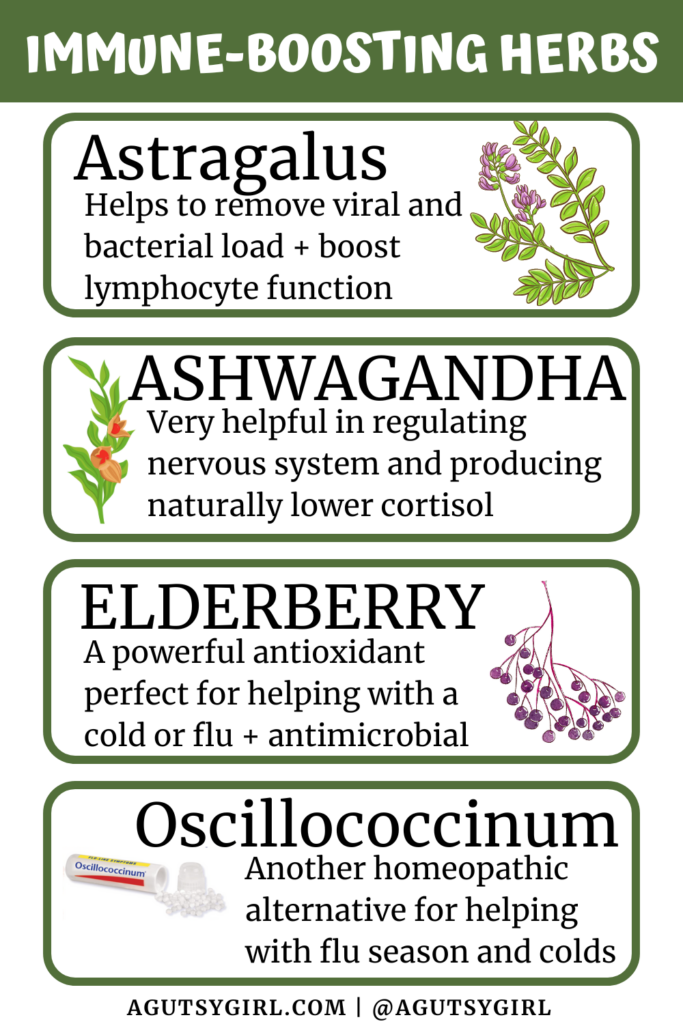
Immune-Boosting Herbs
Many herbs are often used to boost immune function and reestablish healthy inflammatory responses.
In the episode, Dr. Taz lists some of the best herbs for anyone who presents with a weakened immune system.
Astragalus
This herb dates itself back to traditional Chinese medicine and has great immune-boosting properties.
It helps to load viral and bacterial load within the body as well as boosting lymphocyte function (some of the cells responsible for immune response).
THIS is one of the best formulas as it contains a mix of astragalus, vitamin C, and zinc.
Ashwagandha
This herb is very helpful in regulating the nervous system. It is a great way to naturally lower cortisol levels and is usually taken in capsule form.
Elderberry
A powerful antioxidant perfect for helping with a cold or flu. This also contains antimicrobial properties which encourage a balanced microbiome.
Oscillococcinum
Another homeopathic alternative for helping with flu season and colds. It promotes a strong immune system.
Mushrooms
Can have antibacterial properties on top of boosting immune function.
- Reishi
- Turkey tail
- Shiitaki
All of these natural remedies can help boost the body’s immune response which will play a HUGE part in your overall health. clinical studies scientific studies
Lifestyle Changes for Immune Support
There are also a variety of lifestyle changes you can implement to encourage both a healthy immune and gut response.
Sleep
Getting enough sleep is KEY to any sort of healing that takes place in the body.
Your body needs at least 90 minutes of deep REM sleep each night in order to operate at its fullest potential.
Not having enough high quality sleep will damage both your gut and immune functioning.
Sleep is such a critical part to gut healing that it’s included on every single page of your gut healing journaling system, Ahara Dinacharya.
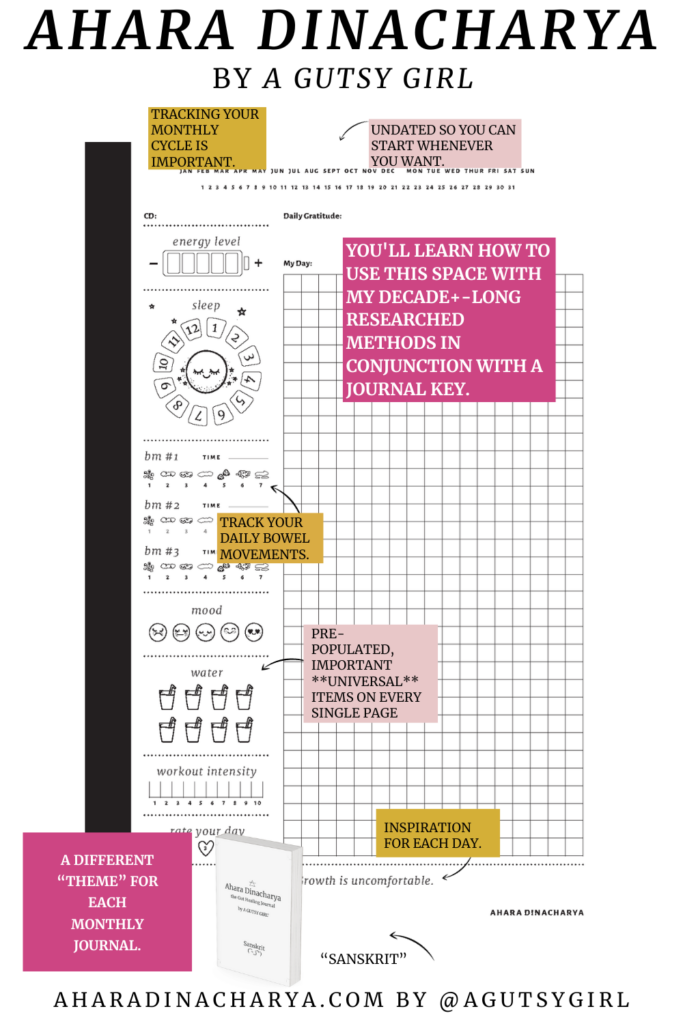
Stress management
Another key aspect of healing is managing stress levels. With high stress comes higher inflammation, so finding outlets for this stress is critical.
Acupuncture
This practice helps balance the nervous system and promotes a healing state for the body. This creates the foundation for rebuilding healthy cells,
Massage
This has been shown to improve blood circulation and lymphatic drainage, which plays an important role in both the immune and GI systems.
IV Therapy
This can include administering nutrients such as vitamin C or glutathione (contains key amino acids) to the body to help the body’s pre-existing systems.
There are a variety of different uses for IV therapy, so make sure you are targeting the correct system.
All of these methods would be great to implement into your gut-healing journey.
I would recommend setting the foundation with quality sleep and stress management and then trying out the other different ways of supporting your gut.
This will help you boost immunity and overall health.
3 Convictions for Gut Health and Gut Healing
Dr. Taz closes off with some of her top convictions on everything gut-related.
- The gut is ground zero for your health.
- Mastering your physical health is about soul alignment.
- Every woman is a superwoman and needs to understand their formula for success (gut, immune, and hormones).
More from A Gutsy Girl
Want to learn even more about the gut and ways to heal it?
The best way to learn all the secrets is via my signature book, A Gutsy Girl’s Bible: a 21-day approach to healing the gut. Grab your copy on Amazon HERE.
- Welcome to A Gutsy Girl Podcast
- Hang out on Instagram
- BFF’s on YouTube
- Resource: The Master Gutsy Spreadsheet
- Rated-G Email Club
Wrap Up
Time to wrap this up. As always, a huge goal for this show is to connect with even more people. Feel free to send an email to our team at podcast@agutsygirl.com. We want to hear questions, comments, show ideas, etc.
Did you enjoy this episode? Please drop a comment below or leave a review on Apple Podcasts.
Bio: Dr. Taz Bhatia, M.D.
Dr. Taz Bhatia, M.D. (aka Dr. Taz) is a board-certified integrative medicine physician, wellness expert and founder of CentreSpring MD, an award-winning medical and wellness practice in Atlanta, GA focused on health transformation.
She gained national recognition as a best-selling author of the books, “What Doctors Eat,” “The 21 Day Belly Fix,” and “Super Woman RX.”
Her integration of Eastern medical wisdom with modern science, along with her unique Power Type discovery, has led to featured segments on The Today Show, Good Morning America, CNN and eventually the premiere of her own PBS special Super Woman RX with Dr. Taz.
She is also the host of the Super Woman Wellness podcast, and the health & wellness contributor for FOX Good Day Atlanta.
Dubbed “a superwoman in her own right,” Dr. Taz is dedicated to empowering women to radically transform their lives through personalized lifestyle, diet, exercise, self-care and relationship strategies to help them rediscover their own “superpowers.”
As a proud member of the Southeast Board for UNICEF USA, she is committed to improving the health of children and families around the world.
If you liked this post on FODMAP diet plan recipes you might also enjoy:
- Interesting Facts About the Immune System {Plus 13 Science Backed Ways to Boost Your Immune System}
- Immune Boosting Gut Health Support
- Ultimate IgG Immune and Digestive Support
Xox,
SKH
Janie Greene is




